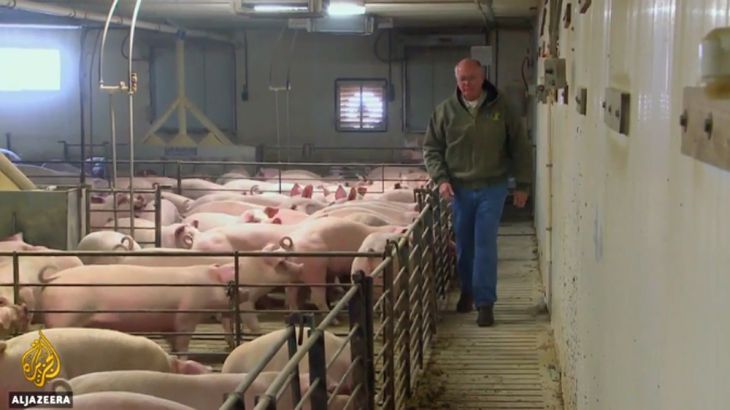China imposes retaliatory tariffs on US products
Retaliatory tariffs make it more expensive for China to buy US products, including pork, a big part of China’s diet.

Beijing has imposed tariffs of up to 25 percent on more than 120 American products, including pork, fruits, nuts and wine, in retaliation to US President Donald Trump‘s decision to raise duties on Chinese imports.
China said the decision, which affects around $3bn worth of imports from the United States, is aimed at safeguarding its interests and balancing losses caused by tariffs imposed by Trump.
Keep reading
list of 4 itemsTakeaways from day 11 of Trump’s New York hush money trial with Hope Hicks
Five takeaways from day 10 of Donald Trump’s New York hush money trial
Trump held in contempt of court in New York trial for gag order violations
Al Jazeera’s Adrian Brown, reporting from Beijing, said the move is only the first round of response from China against the US.
|
|
The new tariffs will make it more expensive for Chinese consumers to buy US products, including pork, which is an important part of China’s diet, Brown said.
“China has to import pork from the United States and other countries because domestic producers cannot produce enough to satisfy demand here,” he said.
“Chinese people are big consumers of pork. Potentially, this is going to hurt them in the pocket,” he said.
Brown said the tariffs on $3bn worth of US products are still considered small, with possibly more tariffs expected in the coming weeks in retaliation on the steel and aluminium tariffs.
According to statistics from 2017, the US exported an estimated $130.4bn worth of products to China.
In March, Trump signed an order imposing tariffs on as much as $60bn worth of Chinese good.
The US has an estimated $375bn trade deficit with China, and Trump blamed it for the loss of thousands of American jobs.
‘Hurting US farmers’
Meanwhile, US pork farmers have already begun feeling the impact of the new 25 percent tariff on their products bound for China.
“Logistically, economically, no matter what it is, everything ultimately affects the bottom line,” Ronald Simmons, a farmer from the US state of North Carolina, told Al Jazeera’s John Hendren.
|
|
Lee Woodard, director at James Sprunt Small Business Center, said that with the new tariffs, pork products from the US would no longer be competitive on the world market.
“So as it comes into China, ours are now more expensive, therefore, they would pick their pork from some other place,” he said.
Because China is the second biggest customer for US agricultural products after Canada, the US Agricultural Department said farm incomes this year are expected to slide to their lowest level since 2006.
Farmers have been big supporters of Trump, largely because he has been cutting regulations on their industry.
So, when the Chinese looked for targets that would hurt Trump and his supporters most, they knew just where to aim.
“China has been selecting products to inflict maximum economic pain on the United States,” Phil Levy, Chicago Council on Global Affairs, told Al Jazeera.
“It’s not so much that the Chinese are eager to harm the American farmers. On the other hand, they’re not going to take shots from the Trump administration without a response,” he said.
One of the companies that would be most harmed by the tariffs is the North-Carolina-based Smithfield, a Chinese-owned company, proof that China is willing to take losses to wage a trade war it says the US started, Al Jazeera’s Hendren said.